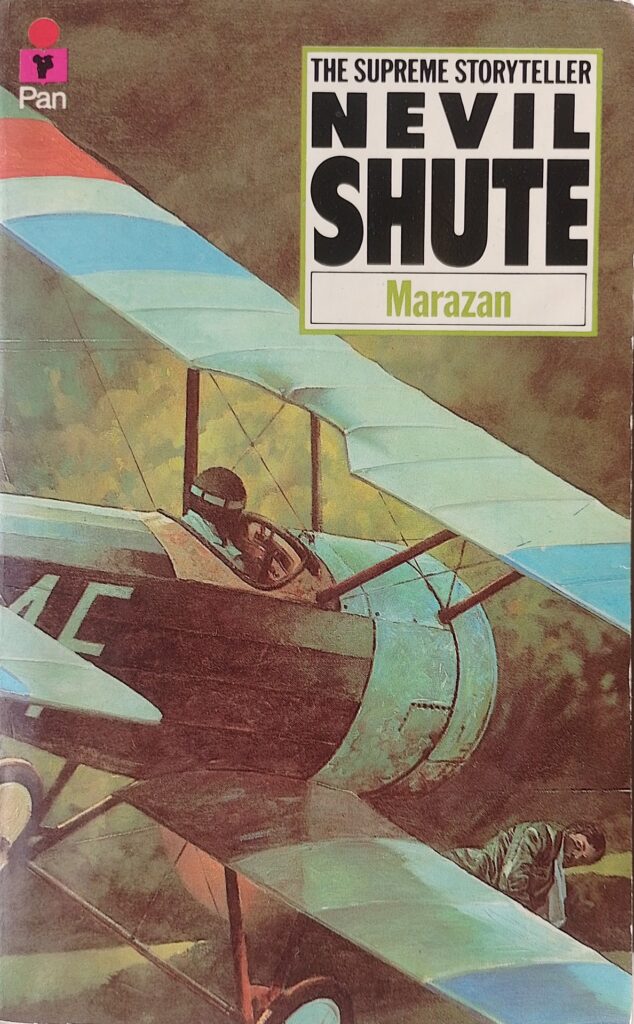First published 1926. Pan paperback, 1982, pp 224, c.85,000 words.
This was Shute’s first published book, and it shows him as an already accomplished story-teller and descriptive writer. Themes that reoccur in many of his novels appear here, notably the sea but also aircraft, both of which he knew a lot about. The woman in the story, Joan Stevenson, is also very much of the Shute type: not especially beautiful (‘rather plain’ [p27]), but with a strong and practical personality and a deep feeling for what is right, drawn from her comfortable English country upbringing.
The protagonist, Philip Stenning, is a conventional thriller type too. He is an ace pilot, tough, bit of a wild character, rather at a loss for what to do after a ‘good war’ (World War One here), upper-middle class orphan in background, with a strong sense of national pride and duty. Richard Hannay from The Thirty-Nine Steps comes to mind, and indeed there are chase sequences and dastardly foreigners echoeing those in that book, but somehow this seems more modern.
In an Author’s Note before the beginning, Shute write that twenty-five years after publication he only felt the need to ‘strike out a few outmoded expressions, such as “topping” and “ripping”’[p5]. He presumable considered that “corking” was not then outmoded, as it is used on perhaps a half-dozen occasions. What is harder to take today (almost a hundred years after first publication) is the casual racism and strong nationalism. An expression like ‘worked like a nigger’ [p11] is obviously unacceptable today, as is ‘It’s a Chink’s game, Chinks and Dagoes’ [p141] which refers to the drug trade. Was Shute unaware that the British once had made an industry of stuffing drugs into China?
Also today the sexism pretty hard to take: ‘I [Stenning] belong to that stern school of yachtsmen who hold that a woman’s place is in the forecastle’ (i.e. kitchen) [p99]. This is said in the context of his rather poor efforts in cooking at sea himself and when he is indirectly thinking of Joan. He goes on to muse: ‘A woman who can make a suet pudding over a Primus stove in the forecastle of a six-tonner on an ocean passage is worth marrying.’
Stenning mentions previous relationships with women, who are all described as ‘Flossies’ [e.g. p8]. By this presumably he means good-time girls: a lot of fun to hang out with, but not the sort a chap of his sort would contemplate marrying. These women must have known what the bargain was: they got to party with the fast set without having to have any cash.
The developing relationship between Stenning and Stevenson is very well handled but archaic in aspect. The word ‘love’ is never used. The pair hardly address one another on a personal level, but each goes out of their way to indirectly support the other. Towards the end, we get what is the closest declaration of love that either makes: Joan says ‘Philip dear, … I think that you’re the best and truest man I’ve ever met.’ He never tell her what he thinks of her, but we get to see him thinking how good it would be to have a like-minded companion, not only on board a yacht, but also with whom to share fine Alpine scenery.
There are a few other expressions that are obscure today such as ‘missing his Kruschens’ [p197]; Kruschens Salts was apparently a popular remedy for all sorts of age-related ailments at the time this was written. ‘Kreisler’ was a popular Austrian virtuoso violinist and composer.
Another interesting aspect of this book is the description of the political scene in Italy with the emergence of fascism. There was clearly much admiration for its ability to get things done, getting the country to function, but that is tempered by the realisation that there was little constraint once it had taken hold, and that bad actors would seize control for their own personal and political ends. Stenning has an interesting relationship with an Italian aristocrat who had been a fellow pilot.
Putting all the above aside, this is a first-class thriller. The story bowls along in a reasonably coherent manner from one dramatic scene to another. The central characters are original, believable humans, and the protagonist develops into a more mature individual by the end. The writing, if unsurprisingly a little archaic, is of a high standard. Despite being a hundred years old, it still feels set in the modern world and is an easy and entertaining read.
Wikipedia biography of Shute: https://en.wikipedia.org/wiki/Nevil_Shute
Wikipedia summary of the book: https://en.wikipedia.org/wiki/Marazan
Others’ reviews of the book: https://www.goodreads.com/book/show/107323.Marazan?ref=nav_sb_ss_1_7
© William John Graham, April 2024

